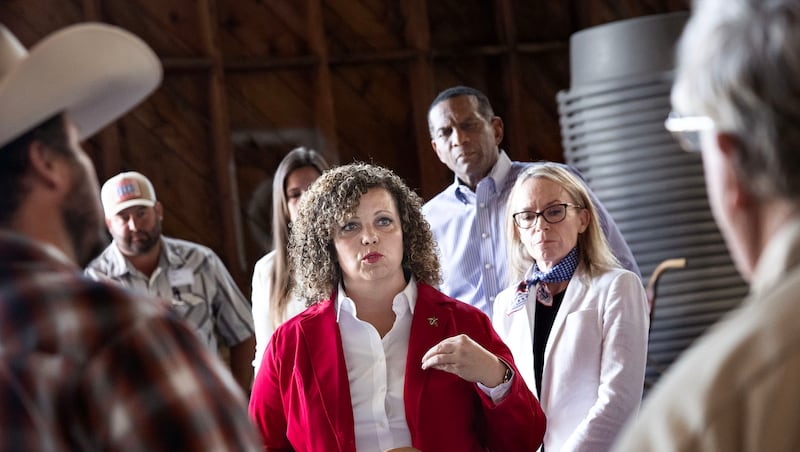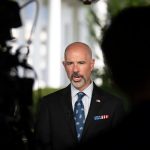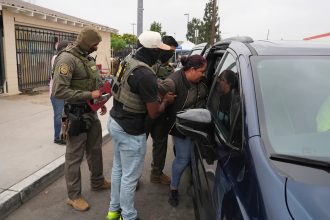It is not every day that you see sitting members of Congress carrying a shepherd’s staff.
But at a warehouse in Tooele County on Thursday, Reps. Celeste Maloy and Burgess Owens from Utah’s delegation were brandishing them proudly.
“We want to make farming great again,” Owens said. “This is the culture that defines our country.”
The two GOP members organized an event at the Utah Wool Growers Association’s warehouse, where stacks upon stacks of wool simply sit. Some of it has been sitting there since 2017.
It has nowhere to go, because the U.S. demand has been undercut drastically by Australia and New Zealand.
Scott Stubbs speaks to Rep. Celeste Maloy, Dr. Julie Callahan, assistant U.S. trade representative for the Office of the U.S. Trade Representative, and Rep. Burgess Owens and other sheep ranchers at the Utah Wool Marketing Association’s office in Tooele on Thursday, Aug. 14, 2025. | Laura Seitz, Deseret News
Like many industries across the United States, agriculture has been relegated to other countries to control. U.S. wool has to be shipped to New Zealand to be tested and then returned. That drives up prices and underscores the lack of processing facilities in this nation.
This is a problem that has been around for years and years, but Maloy and Owens are trying to change that by pushing the U.S. Trade Commission to implement a tariff rate quota on imports of lamb from foreign countries.
The wool problem also has to be fixed, they said.
Maloy and Owens brought the issue to attention with a letter they sent to trade regulators.
Julie Callahan, the assistant U.S. trade representative for agriculture affairs and commodities, spoke at the event Thursday morning.
She assured a group of disenchanted sheep ranchers it is at top of mind for the Trump administration, acknowledging action needs to be taken to correct what has turned into a disastrous situation for these families across the West.

Dr. Julie Callahan, assistant U.S. trade representative for the Office of the U.S. Trade Representative, center, with Rep. Burgess Owens and Rep. Celeste Maloy, speaks with sheep ranchers at the Utah Wool Marketing Association’s office in Tooele on Thursday, Aug. 14, 2025. | Laura Seitz, Deseret News
“I lose sleep overnight because of this,” she said.
Callahan assured the Utah ranchers that she would take the message back to Washington, D.C., to help rebuild the industry.
The issue is also one of the top priorities for many Utah legislators.
In May, Utah politicians sent a letter to the Secretary of Agriculture Brooke Rollins to bring attention to a number of issues that demand attention.
One of those signatories was state Rep. Tiara Auxier, R-Morgan.
Auxier stood in the warehouse full of wool waiting to go nowhere because of what she believes are trade practices and regulatory hurdles that are hard to overcome for domestic wool producers.
Auxier is passionate about agriculture and wants to get the message out to Utah residents who may be in urban settings and don’t quite understand.
Not about welfare farming

Jake Benson of Parawan attends a meeting with Rep. Celeste Maloy, Dr. Julie Callahan, assistant U.S. trade representative for the Office of the U.S. Trade Representative, and Rep. Burgess Owens at the Utah Wool Marketing Association’s office in Tooele on Thursday, Aug. 14, 2025. | Laura Seitz, Deseret News
“We don’t have to work this hard to be broke,” said Utah rancher Jacob Benson.
Scott Stubbs is a fifth-generation sheep rancher in Iron County. He said it is getting harder year by year to be a sheep rancher.
“We have a bad habit in our industry of not admitting we have a problem,” he said.
“I want to sell my product with my head held high,” Stubbs said. “We want to have a level playing field.”
Brett Selman runs sheep out of Tremonton and is a fourth-generation rancher. As each year passes, however, his hope of continuing to make a living with his sheep starts to dim.
“My son is not going to keep doing this unless things change.”
He said ranchers like him don’t want payments from the government. They want to be independent and have a fair chance of making it work and earn a little bit of money.
When the federal government steps in and offers assistance, it is not what they want.
“It makes us feel like welfare farmers.”
Carson Jorgensen is a sixth-generation sheep rancher in Sanpete County.
He said there was a time when a place in Utah called Fountain Green used to be hailed as the richest little town in America.
“But it is pretty hard for an American rancher to watch 74% of lamb imports coming in from other countries,” he said. “We are looking down the barrel of bankruptcy.”
He stressed it is not that demand is down, it’s that the field of play that is tipped in favor of other countries.
“There is a demand for domestic lamb.”
It is a prized product at farmers’ markets and home-grown agriculture is taking off for people who want to eat “clean” and know where their food comes from.

Carson Jorgensen, a sixth-generation sheep rancher, listens during a meeting with Rep. Celeste Maloy, Dr. Julie Callahan, assistant U.S. trade representative for the Office of the U.S. Trade Representative, and Rep. Burgess Owens, and other sheep ranchers at the Utah Wool Marketing Association’s office in Tooele on Thursday, Aug. 14, 2025. | Laura Seitz, Deseret News
Yet, across the country the competition is tough because of foreign imports and the lack of handling what is grown and raised in the United States.
No one who knows anything about farming gets into it to get rich. Farmers love the land and the tradition. That’s what Maloy urgently wants to preserve as part of the heritage of Utah and the West.
“It is a really, really big deal,” Maloy said, as ranchers in attendance nodded in agreement.
Maloy emphasized there have been promises to ranchers to just hang on another year or two.
“We don’t want that,” she said, adding the wait should be over.
“If we save the Utah sheep industry we will help Nevada,” and other states tackling the same problem.
As time drags on, ranchers across the West are being pinched by foreign imports and the lack of processing facilities in the United States for meat and wool.
“I have yet to see fair trade,” Jorgensen said. “There is no such thing as fair trade.”
The dire case for change

Rep. Celeste Maloy, Dr. Julie Callahan, assistant U.S. trade representative for the Office of the U.S. Trade Representative, and Rep. Burgess Owens tour the Utah Wool Marketing Association in Tooele on Thursday, Aug. 14, 2025. | Laura Seitz, Deseret News
Maloy has rural blood in her veins and is trying to inject reformation into the agricultural industry. She’s been in the field of dairy farmers and understands the roots of home-grown food.
She stressed there needs to be a wake up call for people who care about where their food and fiber comes from.
“We are losing a piece of who we are.”









